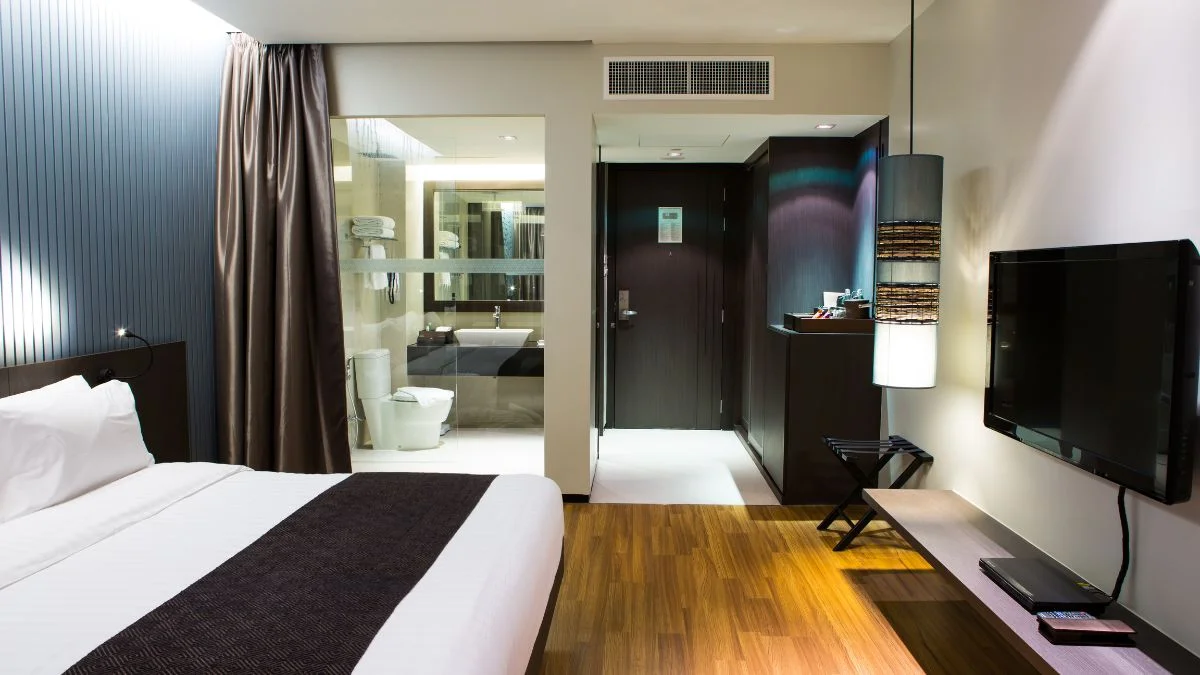What Does Hearing Accessible Mean for a Hotel Room? (& Who Can Book It)

As participants in Amazon Associates and other programs, we earn from qualifying purchases. This comes at no additional cost to you. For more details, see our Affiliate Disclosure.
Traveling and finding the right accommodation can be an exhilarating experience for many. But for those with hearing impairments, the journey comes with an extra layer of considerations: ensuring their stay is both comfortable and safe. “Hearing accessible” hotel rooms are designed to cater to this very need, yet not everyone is familiar with what this entails or who can reserve these specialized rooms. Dive into the details to understand the features of hearing accessible rooms and how they make a difference in the traveling experience for those with hearing challenges.
HIGHLIGHTS
- Hearing accessible hotel rooms are specifically designed with features such as visual alert devices, vibrating alarm clocks, and TTY devices to cater to the needs of guests with hearing impairments.
- The hotel industry is taking significant steps to elevate the experience for guests with hearing challenges, including advanced technology integration, staff training, and providing assistive listening devices in communal areas.
- Hearing accessible rooms are primarily intended for individuals with hearing impairments, but the broader eligibility can include anyone with a genuine need for the room’s unique features.
Understanding Hearing Impairments and Travel Needs
Hearing impairment, often referred to as hearing loss, is a reduced ability to hear sounds in the same way as those with normal hearing. This impairment can range from mild to profound and can be congenital (from birth) or acquired throughout life due to various reasons such as age, injury, or illness.
With millions worldwide living with some degree of hearing impairment, it’s essential to recognize their unique needs, especially when traveling.
When on the move, those with hearing impairments face challenges that others might overlook. Simple things, like hearing an announcement about a delayed flight, catching an alarm clock’s ring, or being alerted to an emergency, can be significant barriers.
Thus, traveling is not just about getting from point A to point B; it’s about ensuring safety, staying informed, and experiencing the journey with as much ease and enjoyment as possible.
Hotels play a crucial role in this aspect of travel. As the temporary ‘home away from home,’ hotels have the responsibility to ensure that guests, regardless of their hearing abilities, are provided with facilities that ensure safety and enhance their stay experience.
This is where the concept of “hearing accessible” rooms comes into play, ensuring that the specific travel needs of those with hearing impairments are adequately addressed.
Key Features of a Hearing Accessible Hotel Room
For many travelers with hearing impairments, staying in a hotel room that isn’t equipped to meet their needs can be frustrating and potentially unsafe. A hearing accessible hotel room, on the other hand, is designed with a range of features tailored specifically to assist guests with hearing challenges. Here’s a closer look at these indispensable features:
- Visual Alert Devices: These devices replace traditional auditory signals with visual ones. For instance, doorbells and phones might have accompanying flashing lights to alert guests when someone is at the door or calling.
- Vibrating Alarm Clocks: A traditional alarm clock might go unnoticed by someone with profound hearing loss. Vibrating alarm clocks, often placed under the pillow or mattress, ensure guests wake up on time through tactile stimulation.
- TTY (Text Telephone) Devices: For guests who use sign language or communicate better in written form, TTY devices help them connect with hotel staff or outside services without relying on voice calls.
- Closed Captioning on Televisions: This feature allows guests to read on-screen text of dialogues or narratives, ensuring they don’t miss out on any information while watching TV.
- Visual and Tactile Emergency Alarms: In case of emergencies like fires, visual alarms (strobe lights) complement traditional auditory alarms, while vibrating devices can be used to alert guests who might be asleep.
- Telephone Amplifiers: These are designed for those who have some residual hearing. They amplify the sound of the telephone, making it easier for the guest to hear the conversation.
- Door Knock Sensors: These sensors detect a knock on the door and trigger a light or vibrating signal to alert the guest.
- Clear Signage: Properly marked rooms and clear signage help reduce confusion and make navigation within the hotel easier for guests with hearing challenges.
- Accessible Guest Services: Many hotels train their staff to communicate effectively with guests who have hearing impairments, whether it’s through basic sign language, written communication, or using specific devices.
- Infrared Listening Devices: In conference or entertainment areas, these devices help amplify sounds for guests with hearing impairments, ensuring they don’t miss out on speeches, shows, or presentations.
In essence, a hearing accessible hotel room prioritizes the guest’s safety and convenience, ensuring that their stay is as pleasant and worry-free as possible.
The Importance of Visual Alerts and Alarms
In our day-to-day lives, auditory signals are omnipresent. They inform us when someone’s at the door, alert us to potential dangers, and act as reminders for tasks like waking up or answering a phone call. For individuals with hearing impairments, however, these signals can be easily missed. This is where visual alerts and alarms play a pivotal role, especially in the context of hotel accommodations.
Safety First: The primary purpose of alarms is to ensure safety. In emergencies, such as fires, gas leaks, or security breaches, immediate action is crucial. Visual alarms, such as strobe lights, provide a noticeable warning for guests with hearing impairments, ensuring they can react promptly.
Enhanced Communication: Visual alerts bridge the communication gap between hotel staff and guests. Whether it’s a door knock sensor indicating someone outside or a flashing light signifying an incoming phone call, these alerts ensure that guests are always in the loop.
Independence and Empowerment: Relying on someone else to convey auditory information can be inconvenient and sometimes undignified. Visual alerts allow guests to be self-reliant, enhancing their overall hotel experience.
Ensuring Uninterrupted Rest: With vibrating alarm clocks and visual wake-up alerts, guests can have the peace of mind that they won’t oversleep or miss out on planned activities.
Legal Considerations: Many countries and regions have legal requirements in place for public accommodations, like hotels, to be accessible to people with disabilities. This includes the provision of visual alerts and alarms for those with hearing impairments.
Positive Guest Experience: Beyond the pragmatic and safety reasons, there’s the matter of ensuring every guest feels valued and catered to. By providing visual alerts and alarms, hotels demonstrate a commitment to inclusivity and thoughtful service, fostering loyalty among guests.
Visual alerts and alarms are not just about convenience; they’re about ensuring that every guest, irrespective of their hearing ability, can have a safe, enjoyable, and dignified stay. Investing in and understanding the significance of these features reflects a hotel’s dedication to accessibility and exceptional guest service.
Additional Amenities for the Hearing Impaired
A hotel’s commitment to inclusivity and comfort extends beyond just the basic visual alerts and alarms for guests with hearing impairments. By providing additional amenities tailored specifically for such guests, hotels can create a welcoming and barrier-free environment. Here are some of the enhanced amenities that truly set apart hotels committed to serving the hearing impaired:
- Sign Language Interpretation Services: Offering sign language interpreters, either on-site or via video services, ensures that communication between guests and staff is smooth and effective.
- Assistive Listening Devices (ALDs): ALDs can be used in areas like conference rooms, theaters, or lobbies. They amplify sounds, making it easier for guests with partial hearing loss to engage in events or conversations.
- Hearing Aid-Compatible Phones: Phones with this feature are designed to minimize interference and deliver clearer sound to hearing aids and cochlear implants.
- Information in Written Form: Providing key hotel information, like rules, services, and emergency procedures in written form ensures that all guests have easy access to important details.
- Induction Loop Systems: Often set up in public areas or meeting rooms, these systems transmit sound directly to hearing aids, ensuring guests can participate in public discussions without background noise interference.
- Video Relay Services (VRS): This allows guests to communicate over the phone using sign language through a video device. An interpreter relays the conversation between the sign language user and the voice phone user.
- Training for Hotel Staff: Ensuring that hotel staff are trained in basic sign language or are at least aware of the needs of hearing-impaired guests can significantly improve the overall guest experience.
- Accessibility Apps: Some forward-thinking hotels may provide or integrate with apps designed to assist the hearing impaired, offering real-time captions, visual alerts, or text notifications for hotel services.
- Accessible Tours and Activities: For hotels offering tour services, ensuring that these are accessible—with the provision of sign language guides or written information—can make a world of difference for guests looking to explore the local area.
- Feedback and Suggestions Systems: Having a system in place for guests to provide feedback on the hotel’s accessibility features ensures continuous improvement and understanding of evolving needs.
By offering these additional amenities, hotels not only enhance the experience for guests with hearing impairments but also showcase a deep commitment to inclusivity, understanding, and exceptional hospitality. It’s about creating an environment where every guest feels recognized, valued, and catered to.
How Hotels are Elevating the Experience for Guests with Hearing Impairments?
In the ever-evolving landscape of hospitality, hotels have been quick to recognize the importance of catering to guests with hearing impairments. To ensure these guests have an unparalleled experience, many establishments have adopted innovative approaches.
One significant change has been the adoption of advanced technology. Hotels now equip rooms with state-of-the-art visual and tactile alert systems. These systems go beyond traditional flashing lights, offering synchronized alerts for various devices and even integrating with guests’ personal smartphones for notifications.
Another significant move has been the focus on staff training. Many hotels are investing in training programs where staff learn basic sign language or techniques to communicate more effectively with guests who have hearing challenges. This not only enhances the guest experience but fosters a sense of inclusivity and understanding.
Moreover, recognizing the importance of leisure and entertainment, some hotels have started providing assistive listening devices in their theaters, conference areas, and event spaces. These devices amplify sound, ensuring guests with hearing impairments can enjoy performances, speeches, and presentations without any hindrance.
The integration of accessibility features into hotel apps and websites is another notable advancement. These digital platforms now come with real-time captions, sign language interpretation, and visual notifications, ensuring guests can seamlessly access services, make requests, or get information.
Lastly, many hotels are actively seeking feedback from guests with hearing impairments. By understanding their experiences and needs, hotels can further refine their offerings and ensure that their establishments aren’t just accessible but genuinely welcoming for all.
The hotel industry’s steps towards enhancing the experience for guests with hearing impairments highlight a broader move towards inclusivity and exceptional guest service.
Who is Eligible to Book a Hearing Accessible Room?
The primary intent behind hearing accessible rooms in hotels is to cater to the needs of individuals with hearing impairments, ensuring their safety and comfort during their stay. However, the question of eligibility can sometimes be a bit nuanced.
Primarily, individuals with hearing impairments, whether mild or profound, are the target audience for these rooms. They are designed with features specifically intended to support and assist guests who might otherwise miss out on traditional auditory alerts or find it challenging to communicate using standard hotel devices.
Beyond the obvious demographic of those with hearing loss, individuals with certain medical conditions or circumstances might also find the features of a hearing accessible room beneficial. For instance, someone recovering from an ear surgery, even if temporary, might prefer the visual alerts provided in such rooms.
However, it’s essential to approach the booking of these rooms ethically. Just as with parking spaces designated for individuals with disabilities or other accessible amenities, hearing accessible rooms should be reserved primarily by those who genuinely need them.
If a hotel is fully booked, and only hearing accessible rooms are left, then other guests might be accommodated there, but they should always be aware that they might be relocated if someone with a hearing impairment requires the room.
To streamline the process and ensure fairness, some hotels might request guests to provide a brief reason for needing the room upon booking. Others trust the judgment and integrity of their guests, believing that the majority will book responsibly.
While hearing accessible rooms are primarily designed for guests with hearing impairments, the broader eligibility can encompass anyone with a genuine need for the room’s unique features. However, the onus is on both guests and hoteliers to ensure that these rooms are allocated in the most appropriate and considerate manner.
The Process of Booking a Hearing Accessible Room
Booking a hearing accessible room, while not drastically different from booking a standard hotel room, often involves a few additional steps to ensure the specific needs of the guest are met.
1. Research: Start by researching hotels that offer hearing accessible rooms. Many hotel websites will provide detailed information about their accessibility features, and some even have virtual tours of these rooms.
2. Direct Communication: While many hotel booking platforms allow you to reserve accessible rooms, it’s often recommended to contact the hotel directly. This way, you can discuss your specific needs and ensure the room meets your requirements.
3. Specify Needs: When communicating with the hotel, be clear about what features you need. Whether it’s visual alarms, TTY devices, or other amenities, outlining your requirements will ensure you get the right room.
4. Confirmation: Once your room is booked, it’s a good practice to get a written confirmation, either via email or print, which states the type of room you’ve reserved and its features. This can be helpful in case of any discrepancies during check-in.
5. Early Check-In: Consider checking in a bit earlier than the usual time. This gives you a chance to familiarize yourself with the room’s features and address any concerns or queries right away.
6. Feedback: After your stay, provide feedback to the hotel. This not only helps them improve their services but also benefits other guests with hearing impairments in the future.
While the process might involve a few more steps, the end goal is to ensure a seamless and comfortable stay for those with hearing challenges. With awareness and demand growing, many hotels are continuously working to make this process as straightforward and efficient as possible.






